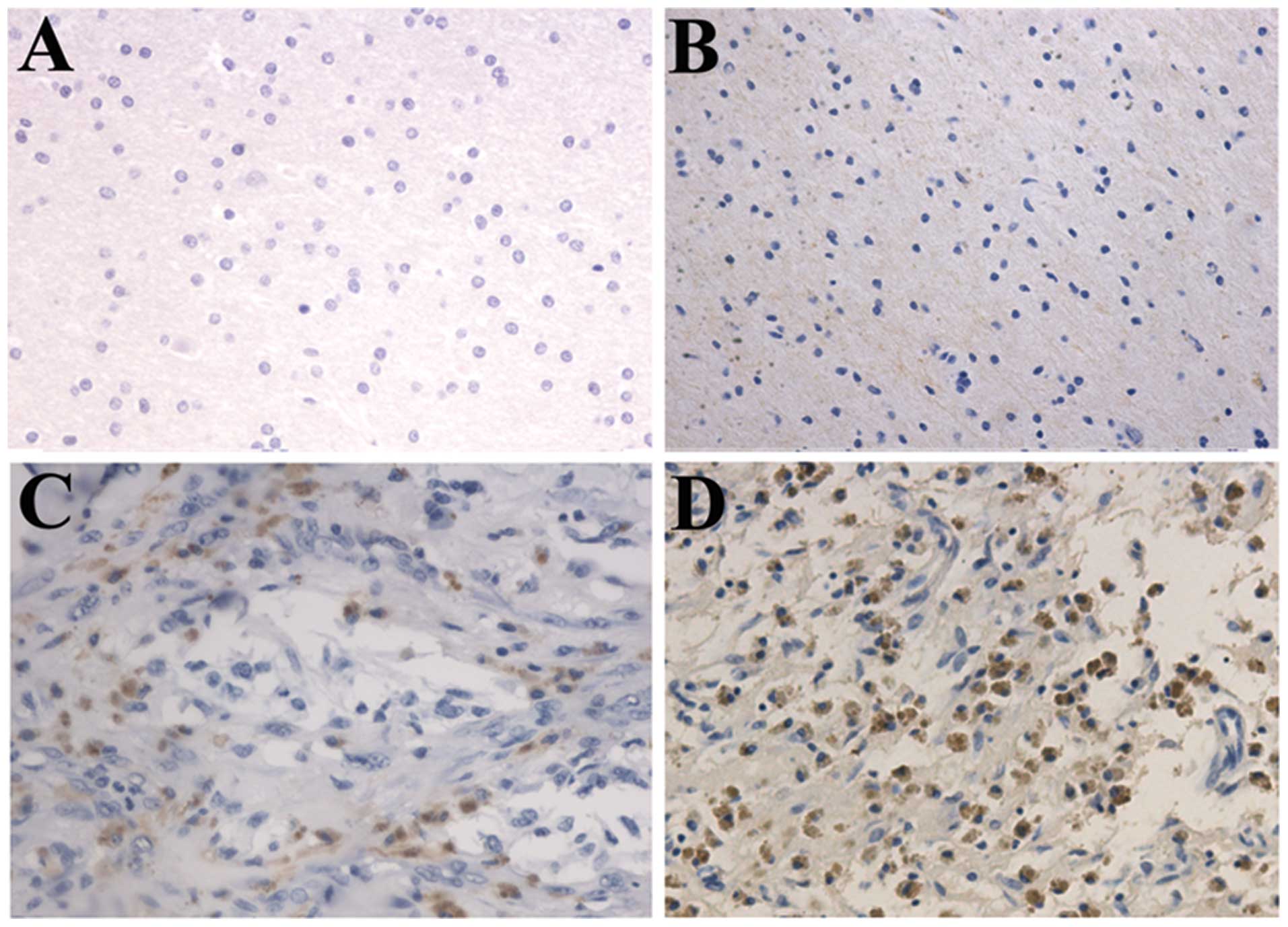|
1
|
Zhang W, Yan W, You G, Bao Z, Wang Y, et
al: Genome-wide DNA methylation profiling identifies ALDH1A3
promoter methylation as a prognostic predictor in G-CIMP-primary
glioblastoma. Cancer Lett. 328:120–125. 2013. View Article : Google Scholar : PubMed/NCBI
|
|
2
|
Zhang J, Huang K, Shi Z, Zou J, Wang Y, et
al: High β-catenin/Tcf-4 activity confers glioma progression via
direct regulation of AKT2 gene expression. Neuro Oncol. 13:600–609.
2011.
|
|
3
|
Chen L, Han L, Zhang K, Shi Z, Zhang J, et
al: VHL regulates the effects of miR-23b on glioma survival and
invasion via suppression of HIF-1α/VEGF and β-catenin/Tcf-4
signaling. Neuro Oncol. 14:1026–1036. 2012.PubMed/NCBI
|
|
4
|
Yan W, Zhang W, You G, Zhang J, Han L, et
al: Molecular classification of gliomas based on whole genome gene
expression: a systematic report of 225 samples from the Chinese
Glioma Cooperative Group. Neuro Oncol. 14:1432–1440. 2012.
View Article : Google Scholar : PubMed/NCBI
|
|
5
|
Wang Y, Li S, Chen L, You G, Bao Z, et al:
Glioblastoma with an oligodendroglioma component: distinct clinical
behavior, genetic alterations, and outcome. Neuro Oncol.
14:518–525. 2012. View Article : Google Scholar : PubMed/NCBI
|
|
6
|
Zhang W, Zhang J, Yan W, You G, Bao Z, et
al: Whole-genome microRNA expression profiling identifies a
5-microRNA signature as a prognostic biomarker in Chinese patients
with primary glioblastoma multiforme. Cancer. 119:814–824. 2013.
View Article : Google Scholar
|
|
7
|
Zhang W, Zhang J, Hoadley K, Kushwaha D,
Ramakrishnan V, et al: miR-181d: a predictive glioblastoma
biomarker that downregulates MGMT expression. Neuro Oncol.
14:712–719. 2012. View Article : Google Scholar : PubMed/NCBI
|
|
8
|
Starkweather AR, Sherwood P, Lyon DE,
McCain NL, Bovbjerg DH, et al: A biobehavioral perspective on
depressive symptoms in patients with cerebral astrocytoma. J
Neurosci Nurs. 43:17–28. 2011. View Article : Google Scholar : PubMed/NCBI
|
|
9
|
Jones PA and Baylin SB: The epigenomics of
cancer. Cell. 128:683–692. 2007. View Article : Google Scholar : PubMed/NCBI
|
|
10
|
Gaspar-Maia A, Alajem A, Meshorer E and
Ramalho-Santos M: Open chromatin in pluripotency and reprogramming.
Nat Rev Mol Cell Biol. 12:36–47. 2011. View
Article : Google Scholar : PubMed/NCBI
|
|
11
|
Feinberg AP and Tycko B: The history of
cancer epigenetics. Nat Rev Cancer. 4:143–153. 2004. View Article : Google Scholar
|
|
12
|
Baylin SB: DNA methylation and gene
silencing in cancer. Nat Clin Pract Oncol. 2(Suppl 1): S4–S11.
2005. View Article : Google Scholar : PubMed/NCBI
|
|
13
|
Ehrlich M: DNA methylation in cancer: too
much, but also too little. Oncogene. 21:5400–5413. 2002. View Article : Google Scholar : PubMed/NCBI
|
|
14
|
Cadieux B, Ching TT, VandenBerg SR and
Costello JF: Genome-wide hypomethylation in human glioblastomas
associated with specific copy number alteration,
methylenetetrahydrofolate reductase allele status, and increased
proliferation. Cancer Res. 66:8469–8476. 2006. View Article : Google Scholar
|
|
15
|
Forbes B, Szabo L, Baxter RC, Ballard FJ
and Wallace JC: Classification of the insulin-like growth factor
binding proteins into three distinct categories according to their
binding specificities. Biochem Biophys Res Commun. 157:196–202.
1988. View Article : Google Scholar
|
|
16
|
Bork P, Holm L and Sander C: The
immunoglobulin fold. Structural classification, sequence patterns
and common core. J Mol Biol. 242:309–320. 1994. View Article : Google Scholar : PubMed/NCBI
|
|
17
|
James MJ, Jarvinen E and Thesleff I:
Bono1: a gene associated with regions of deposition of bone and
dentine. Gene Expr Patterns. 4:595–599. 2004. View Article : Google Scholar : PubMed/NCBI
|
|
18
|
Li S, Yan C, Huang L, Qiu X, Wang Z, et
al: Molecular prognostic factors of anaplastic oligodendroglial
tumors and its relationship: a single institutional review of 77
patients from China. Neuro Oncol. 14:109–116. 2012. View Article : Google Scholar : PubMed/NCBI
|
|
19
|
Hill VK, Ricketts C, Bieche I, Vacher S,
Gentle D, et al: Genome-wide DNA methylation profiling of CpG
islands in breast cancer identifies novel genes associated with
tumorigenicity. Cancer Res. 71:2988–2999. 2011. View Article : Google Scholar : PubMed/NCBI
|
|
20
|
Zhang W, Qiu XG, Chen BS, Li SW, Cui Y, et
al: Antiangiogenic therapy with bevacizumab in recurrent malignant
gliomas: analysis of the response and core pathway aberrations.
Chin Med J. 122:1250–1254. 2009.PubMed/NCBI
|
|
21
|
Schatz P, Distler J, Berlin K and Schuster
M: Novel method for high throughput DNA methylation marker
evaluation using PNA-probe library hybridization and MALDI-TOF
detection. Nucleic Acids Res. 34:e592006. View Article : Google Scholar : PubMed/NCBI
|
|
22
|
Kiukkonen A, Sahlberg C, Lukinmaa PL,
Alaluusua S, Peltonen E, et al: 2,3,7,8-tetrachlorodibenzo-p-dioxin
specifically reduces mRNA for the mineralization-related dentin
sialophosphoprotein in cultured mouse embryonic molar teeth.
Toxicol Appl Pharmacol. 216:399–406. 2006. View Article : Google Scholar
|




















